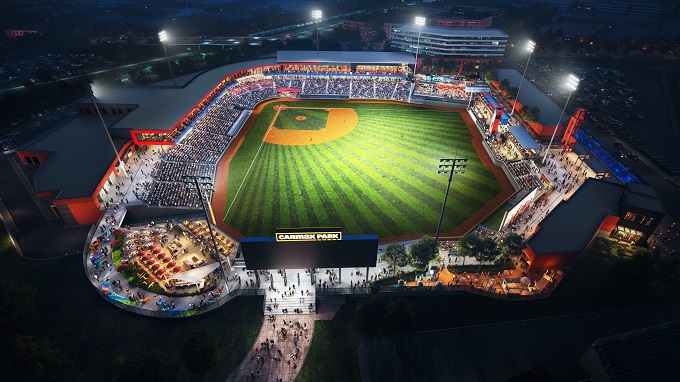
The future CarMax Park that will replace The Diamond and is to anchor the 67-acre Diamond District development. (Image courtesy Richmond Flying Squirrels)
Editor’s note: This is the full version of a report previously presented in two parts.
“If I sound stressed about this, it is because I am. It’s Thursday, February 16. LFG.”
That was the urgency with which Todd “Parney” Parnell, then the VP and COO of the Richmond Flying Squirrels, ended an email to a group of developers and designers who were working on initial plans for the new baseball stadium to replace the ballclub’s aging home of over a decade, The Diamond.
Responding to an email titled “Napkin Numbers” – a reference to notes he’d jotted down during a call two days earlier – Parnell emphasized the timeframe that the group was facing to deliver a new ballpark by Opening Day 2025, the deadline that Major League Baseball had set for all pro baseball venues to meet required facilities standards.
In his reply, Parnell told the group: “We really need you guys to move forward with your development deal so we can really get down to business. We are running out of time on the baseball side and I am becoming…increasingly scared but I don’t control your deal only the developer and the city does.
“So please. Get it done. We need progress and we need it now,” Parnell wrote, ending his message with “LFG” – an acronym for “Let’s freaking go,” or a more colorful version.
That was early 2023.
Final terms for a deal between the City of Richmond and its selected development team at the time, RVA Diamond Partners, would be reached three months later. But the lead developer on that team, D.C.-based Republic Properties, refused to sign off on the deal and withdrew from the project, according to filings in a $40 million lawsuit from Republic that now hangs over the larger Diamond District project – the 67-acre development that the new ballpark is to anchor.
A year later, days before City Council this past May OK’d a reworked deal with Diamond District Partners – a new group led by Republic’s former teammates Loop Capital and Thalhimer Realty Partners – Republic principal Jordan Kramer emailed Lincoln Saunders, Richmond’s chief administrative officer, requesting a call with Republic’s legal counsel “to discuss a settlement.”
Saunders replied asking what there was for them to discuss. “The City terminated its negotiations with (RVA Diamond Partners) and Republic a year ago,” Saunders said.
“As you know,” Kramer responded, “there are differences that need to be bridged between Republic and Thalhimer/Loop to resolve our relationship and the relationship between our partnership and the City. We see the City as a part of any resolution.”
“That doesn’t provide any clarity,” Saunders replied. “There is no existing partnership between Republic and the City.”
The email exchanges bookend the final 15 months of a two-and-a-half-year, at-times tumultuous process to find consensus in the design and nail down a development deal for the new ballpark – now to be named CarMax Park – that had been promised to the Flying Squirrels since the team arrived in Richmond 15 years ago.
Emails obtained by Richmond BizSense through Freedom of Information Act requests to the city reveal how contentious that process became, how the project was reworked and salvaged over that time, and how it came to be that Republic – and later Loop – stepped away from the $2.4 billion public-private project they had won with Thalhimer over 14 other development teams that competed for it.
This report was compiled from those emails, court filings from the lawsuit, and BizSense’s reporting.
‘Little progress on plans’
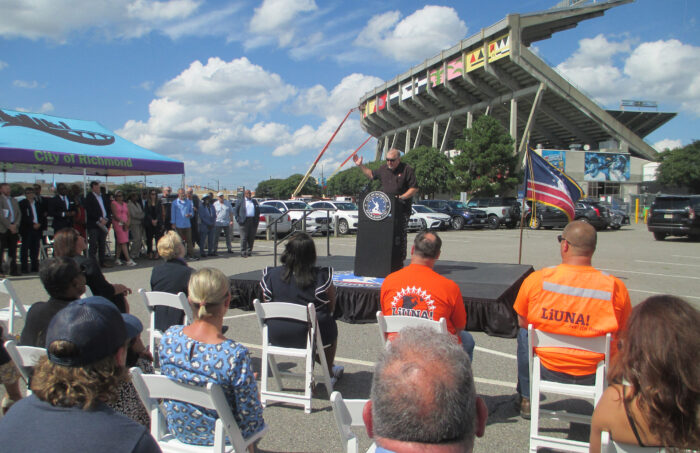
The Flying Squirrels’ Todd ‘Parney’ Parnell addressing attendees at the development team announcement for the Diamond District project in September 2022. (BizSense file photos)
By the time Parnell sent his “Napkin Numbers” email, RVA Diamond Partners was months into the process that started in fall 2022 with a design charette involving Flying Squirrels staff and VCU Athletics, whose Division I baseball team shares the minor-league ballclub’s facilities.
Also involved in the charette were DLR Group and JMI Sports – RVA Diamond Partners’ stadium designer and development consultant, respectively. DLR’s minor-league credits had included Fluor Field stadium in Greenville, South Carolina, and JMI had worked on Chase Center in San Francisco and Petco Park, home to MLB’s San Diego Padres.
But as the process played out over months, with the ballpark being shaped based on the Squirrels’ feedback and within the confines of an originally $80 million projected budget, Squirrels leadership became frustrated with how the process was going in light of MLB’s spring 2025 deadline, which left just enough time for what developers said would need to be at least an 18-month build.
The ballclub’s dissatisfaction was aired publicly in April of last year, when president and managing general partner Lou DiBella put out a statement saying there had been “little progress on plans for a new stadium” and that the club “cannot be confident that the future of the Squirrels in Richmond is secure.”
At the same time, Squirrels leadership had warmed to and stayed connected with David Carlock, principal of Houston-based Machete Group, which had led the runner-up development team that lost out to RVA Diamond Partners. That team had included architecture firm Odell (now LaBella Associates), which designed the minor-league BB&T Ballpark in Charlotte.
DiBella’s statement frustrated city officials and Jason Guillot, the Thalhimer principal who was RVA Diamond Partners’ local lead on the Diamond District.
While setting up a group meeting two weeks after DiBella’s statement, Guillot asked Carlock in an email: “How do we keep all the parties focused to make some progress? I don’t believe that airing our dirty laundry in the press helps us close a deal.”
In another email the same day to Jonathan Fine, an attorney and sports industry advisor for the city, Guillot said he believed that, “after many months, I’ve finally earned some trust by Lou, Larry and Parney,” referring to DiBella, Squirrels co-owner Larry Botel, and Parnell.
However, Guillot added: “I do believe their public display is not fair to the City and to us given how much time we have invested with them to get to this point.”
In the following weeks, the parties held a group call with MLB-owned Minor League Baseball and met with stadium designer DLR during a ChamberRVA-led trip to Kansas City, Missouri, where Guillot, Carlock, Parnell and others toured the stadium for MLB’s Kansas City Royals.
But Guillot’s hopes of having earned DiBella’s trust were soon dashed – as Guillot relayed in an email to Fine, Richmond CAO Saunders and Leonard Sledge, the city’s then-economic development director.
Describing a call he had with DiBella the previous day – the same day that City Council approved the initial development deal with RVA Diamond Partners – Guillot wrote that DiBella had said “that he should have objected more to our team getting selected by the City and that I’m no friend of his.”
“I told him while I don’t expect to win his friendship, we do need to work together productively and that negative quotes in the media by him undermines our ability to convince bond investors that we have an exceptional project and that we’re all rowing in the same direction,” Guillot wrote, adding: “perception matters.”
“He of course took great offense at this and claims he’s not said anything untrue. As we wrapped up the call, he said he should just sell the team because the hassle isn’t worth it,” Guillot wrote. “I asked him what his price is because I might be able to pull together an investor group to take him out. Of course, he said he wants to wait for the new ballpark to be built…”
‘We still have a lot of trust to rebuild’
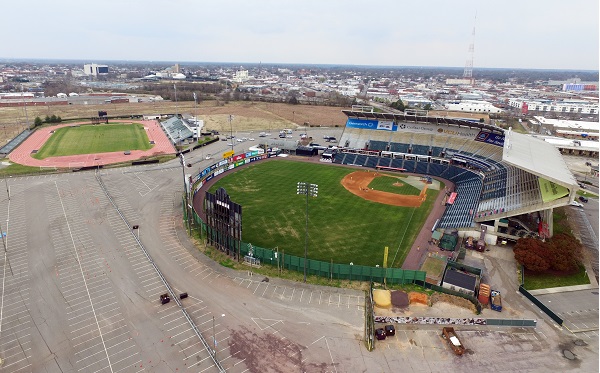
The area that makes up the Diamond District includes the namesake baseball stadium and nearby Sports Backers Stadium.
As tensions were growing between the developers and the Squirrels, they’d also grown between the city and Republic, the lead developer on RVA Diamond Partners that had brought locally based Thalhimer and Chicago-based Loop into the fold.
In early April 2023, a week before DiBella made his frustrations public, Republic sent the city a list of issues with the project that it wanted addressed before it would sign off on a formal development deal. One of those issues was whether the ballpark budget, which by that point had grown to over $90 million, was not sufficient to the city.
A gulf had formed between the parties over the desired capacity and cost of the ballpark, which RVA Diamond Partners had been planning as a 9,000-seat stadium. The Squirrels were insisting on a 10,000-capacity venue – a change that, among others, would ultimately push the ballpark’s cost to over $117 million.
In an email to Republic later that month, Saunders, the CAO, said the city had proposed a financing plan for the stadium, “sized in a manner that we believe is appropriate for the City, that further reduces the financial risk for RVADP while increasing the financial risk for the City.”
Later, while insisting on a meeting with the developers the next day, Saunders added in that email: “We still have a lot of trust to rebuild to get back to a position of feeling comfortable with moving forward with this partnership. Hearing your response tomorrow will be critical to knowing whether we should continue working to reach agreement.”
A deal with RVA Diamond Partners would ultimately be reached. But, soon after the development agreement was approved by City Council, Republic notified Thalhimer that it was exiting the project and “confirmed in writing that it would not continue to participate in the development,” Thalhimer has said.
Republic also notified the city that it had made an offer to Thalhimer and Loop “that would remove us from RVA Diamond Partners and enable them to move forward with the development of the Diamond District,” Republic’s Jordan Kramer said in a May 2023 email to Richmond’s Saunders and Sledge.
“If accepted, Republic would no longer be party to the teaming or operating agreements,” said Kramer, son of Republic board chairman Richard Kramer. “We are waiting to see if Loop and Thalhimer agree to our terms but until we get a firm answer, there’s nothing else we can do at this time.”
Republic had previously told the city that it would deliver by the day of Kramer’s email an operating agreement and governance documents for RVA Diamond Partners, which the three companies were restructuring. The LLC had been structured, according to Republic’s lawsuit, with Republic and Loop each owning 40% and Thalhimer owning 20%.
In a prior email to a lawyer for RVA Diamond Partners, John O’Neill – an attorney with Hunton Andrews Kurth, the city’s outside legal counsel – said the group had “reported that meaningful progress was being made in (the) LLC’s restructuring” and “conversations with additional equity participants were advancing…,” but that Thalhimer had since informed the city that “restructuring progress has stalled.”
With no documents delivered by the date they’d said they would be, Saunders, the city CAO, sent the three companies an email terminating their negotiations on the Diamond District.
“This notification of the consequences of (RVA Diamond Partners’) failure to make such delivery followed the prior failure of RVADP to (1) deliver such governance documents with the terms the City required and (2) execute and deliver the Development Agreement and Purchase and Sale Agreement in a timely manner…” Saunders’ email said.
“We are very disappointed that this action is occurring. But after months of negotiations with RVADP after its selection as the preferred proposer for the Diamond District project…the City can wait no longer for RVADP to resolve whatever internal issues it is facing and risk losing its ability to timely undertake this critical economic development priority.”
The timing of the ballpark had become more urgent in light of MLB’s deadline for all pro baseball venues to meet new facility standards by Opening Day 2025. Months before Saunders’ email, MLB had required $3 million in upgrades to The Diamond that the city had to spend to keep the Squirrels playing there in the meantime.
By the time final terms for the original development deal had been reached, however, officials acknowledged that the ballpark would not meet the 2025 deadline and started aiming instead for spring 2026 – an extension that MLB has appeared to allow.
‘A powder keg with a lot of moving parts’
With Republic off the project, and with no formal agreement with RVA Diamond Partners, the city started weighing how to move the project forward.
In the days following Saunders’ email terminating their negotiations on the Diamond District, George Keith Martin, an attorney with McGuireWoods who was representing RVA Diamond Partners, sought clarification on the fate of the project and asked the city’s outside legal counsel if a deal could be salvaged.
“Does this mean that the City is terminating the award? Is the City willing to work with the RVADP team if they are able to work out an acceptable solution shortly,” Martin asked in an email to John O’Neill, the Hunton attorney representing the city.
O’Neill replied that if the team had solutions it wanted to propose, it should do so “without delay.”
“But,” O’Neill added, “RVADP should understand that the City is evaluating alternatives to achieving the Diamond District project. It will not suspend this evaluation waiting for any solution RVADP wishes to offer and will pursue the approach that is in the best interest of the City.”
Meanwhile, the city continued to work with Thalhimer and Loop, with Thalhimer’s Jason Guillot running point in discussions with the Flying Squirrels ballclub.
At the same time, Squirrels leadership had been informally working with David Carlock, who’d begun advising the Squirrels in design negotiations. Carlock’s Machete Group, the Houston-based venue advisory and development management firm, would later officially become the Squirrels’ stadium consultant, replacing JMI Sports in an arrangement that also saw architecture firm LaBella Associates take over the design work from DLR Group.
Development duties for the overall Diamond District project were ultimately divvied up, with the Squirrels and Machete taking the lead on the ballpark, and Thalhimer and Loop responsible for the rest of the private development in the mixed-use project that’s to also include residential and commercial buildings.
But before that arrangement was formalized, tension between the parties continued to build, emails show.
In late June of last year, weeks after his reported call with Squirrels President Lou DiBella, Guillot declined a request from Carlock and Larry Botel, a Squirrels co-owner, for a look at the stadium’s soft costs budget – the amount of money set aside for non-construction expenses.
“I’ve spoken to the City and we prefer to manage the soft cost budget between the City/Developer at this stage,” Guillot told them in an email.
“The City has been very intentional about setting a not-to-exceed $90,000,000 budget for the hard costs associated with the ballpark and has agreed to an open-book, transparent process whereby they are allowing the team to take the lead on the vast majority of the design decisions despite 100% of the capital costs for the development being funded by the City.
“This is a very fair structure for all parties involved and ensures that the team has ‘ownership’ over the design and while not having any responsibility for the cost of construction as a tenant. The $90,000,000 hard cost budget will not be impacted by any soft costs,” Guillot wrote, adding that “it is our responsibility to ensure that all applicable soft costs are covered by the budget, and if not, for the (City)/Developer to be responsible for any overage.”
Carlock countered that “it’s important that we understand at minimum (1) how the city is allocating project costs and (2) that we know where costs are being carried.” He added: “Please let us know when you will have a soft cost budget available for review,” to which Guillot replied: “We are not sharing the soft cost budget at this time.”
Guillot’s stance prompted a strong response from Botel, the Squirrels co-owner, who pleaded that they all be on the same team.
“(Carlock) and I cannot be the only people on this entire deal trying to move it forward. We need your help,” Botel told Guillot. “You above everyone else on the city and developer side know that the only way this is going to get done is with full cooperation and give and take from all sides of the transaction. (It’s) real estate development 101.”
Contending that Guillot’s statements about a transparent process and the city funding all capital costs while the Squirrels had no responsibility for construction costs as a tenant “are just not true,” Botel said: “This is a $110mm project and (it’s) not open book on $20mm of it.”
Adding that he and Carlock had developed a good rapport with Lincoln Saunders, the city’s chief administrative officer, and that Saunders had been open to many requests they had made, Botel told Guillot, “we are looking to you to do the same.”
“As you know this is a powder keg with a lot of moving parts. We are trying to do everything we can to get to the finish line but (can’t) do that without everyone’s cooperation. We feel like the city is there as best they can be but we need you to be as well. It will only benefit the overall transaction and give it the best chance of getting done.
“This involves not only providing information but also making sure the city is doing everything it can to push the process forward. We are still greatly concerned that DLR and the predevelopment process is underfunded. The fact that we don’t know the water table and soil conditions at this point is troubling to say the least,” Botel said.
“The next 30 days are critical. The schedule allows for no give to get us to opening day 2026. Any pressure you can put on the city to keep things moving, including pressure on them to fund costs, is needed,” Botel said. “Any reasonable information we ask for which will help us get comfortable with signing a lease will help greatly. We need you and Thalhimer to be with us on this.”
‘Walking a fine line’
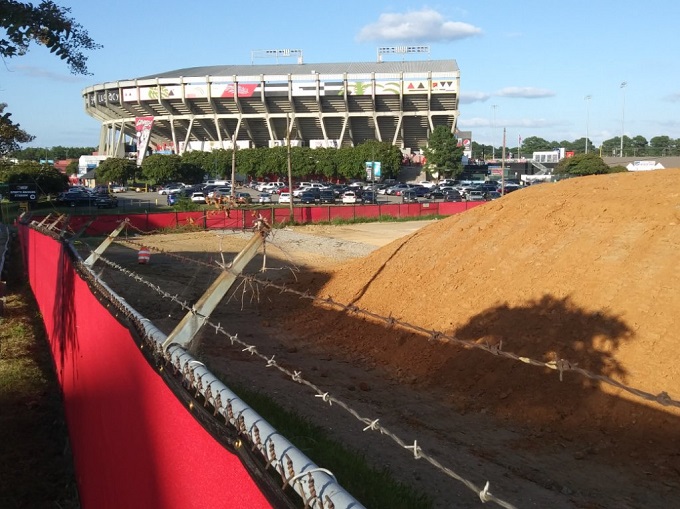
The Flying Squirrels are to continue playing at The Diamond while the new stadium is being built beside it.
In his earlier emails with Jonathan Fine, the city’s sports industry advisor, Guillot described working with both the city and the Squirrels as a delicate balancing act.
“I always felt like I was walking a fine line because the City did not want me talking to the team without them present on every call, but it wasn’t always practical to make sure everyone was on every call and email, especially those that were impromptu,” Guillot told Fine.
“My goal since the project award in September was to develop a relationship and trust with the team, while acknowledging the process that the City outlined and wanted to manage,” he said. “At times I felt like I was threading the needle to manage relationships with both the City and the Squirrels, but my goal was to try and show progress on design and programming while knowing that we were limited in continuing to spend design fees before having a contract with the City.”
As work continued through 2023, Thalhimer and Loop sought to see through their part of the project with another partner to replace Republic. At one point they engaged Lincoln Property Co., a Dallas-based developer that by then was vying for Richmond’s City Center project to replace the downtown Coliseum.
Lincoln Property ultimately did not sign on, and Thalhimer and Loop changed course and reached out to Richmond investors to raise millions of dollars in additional capital needed to move forward with the project without Republic’s investment.
Around the same time, Machete Group had engaged Peterson Cos., a Northern Virginia development firm, about potentially getting involved in the project – an option that was given consideration by the city.
But by this past spring, the city opted to stick with Thalhimer and Loop, and worked out a new deal with Diamond District Partners, the new development team entity that did not include Republic. The deal changed the scope of the project to a 30-acre first phase that Diamond District Partners is signed on to develop, with the rest of the 67-acre site, minus the stadium, to be sold and developed in subsequent phases.
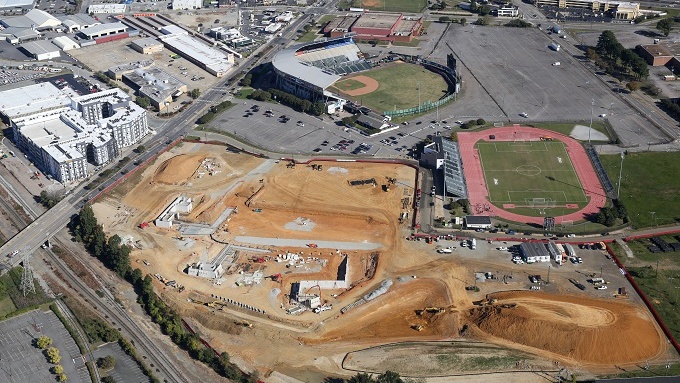
Construction underway on CarMax Park, which will replace the adjacent, nearly 40-year-old Diamond. (Skyshots Photography)
The deal also changed the project’s financing approach, with the city taking on the debt obligation for $170 million in bonds for the ballpark and first-phase infrastructure improvements. Tax revenue from the ballpark and initial development is to be used to pay off the bonds.
Unknown at the time, but soon after the new development deal was OK’d by City Council in May, Loop began to back away from the project, ultimately bowing out as an investor and leaving Thalhimer to lead the team solo.
Two months later, Republic hit Thalhimer and Loop with its $40 million lawsuit, alleging that they breached a venture partnership with Republic when they formed the new entity and entered the new agreement with the city. Thalhimer is fighting the lawsuit, which its CEO has called “baseless,” while Loop contends that it never signed on to either team iteration and should be dropped from the suit.
According to the lawsuit, Thalhimer and Loop proposed buying out Republic’s 40% interest in the venture, and Republic said it would consider a buyout offer. But when they made an offer this past April, the suit states, Thalhimer and Loop “then indicated that they did not have the resources to close on the purchase.”
It was then that Republic’s Jordan Kramer emailed Lincoln Saunders, the city CAO, requesting to discuss a settlement. The email was sent May 5 – three days before City Council’s vote to approve the new agreement.
Home stretch
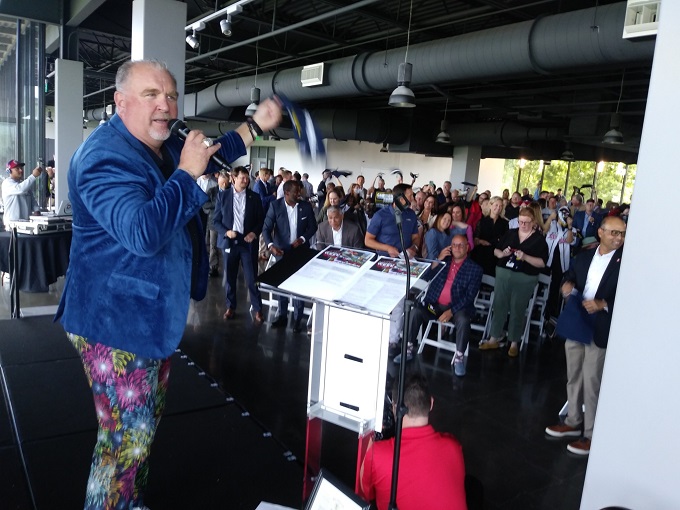
Todd ‘Parney’ Parnell, now a senior advisor with the Flying Squirrels, livens up the crowd at the CarMax Park name announcement in September.
While the lawsuit looms over the larger Diamond District development, which Diamond District Partners is aiming to start next fall, work on CarMax Park is now underway, following approvals of lease and development agreements between the city and the Squirrels.
Under the agreements, the ballclub is to pay $3.2 million in annual rent to the city EDA for each of the first 10 years of a 30-year lease, with lower rents in subsequent years. The overall rent payment over the 30-year lease totals $66 million – among the highest leases in Minor League Baseball, DiBella has said.
The rent commitments were part of a deal worked out between the Squirrels and the city, in which the ballclub agreed to cover any cost overages above the stadium budget. DiBella has said the arrangement was possible only with CarMax’s financial commitment for the ballpark’s naming rights. Terms of that deal have not been disclosed.
At the naming rights announcement and a groundbreaking ceremony for CarMax Park this September, those involved in getting the project to that point acknowledged the rocky road they’d taken to get there.
Addressing CAO Saunders and Mayor Levar Stoney at the naming announcement, DiBella said: “It was hard getting here, not without pain and suffering. And you guys got MF’d enough by me,” prompting laughs from the crowd.
“Lincoln and I, it was so tense with us for so long. But I’ve got to tell you something, I never doubted his commitment to wanting us to get here in a deal that he could feel proud presenting to the citizens of Richmond,” he said.
Addressing Saunders and other officials at the groundbreaking days later, DiBella added: “There were times I didn’t think you knew what the hell was going on or what we were doing. But I’ve got to tell you the truth, I never doubted your commitment to getting it done.”
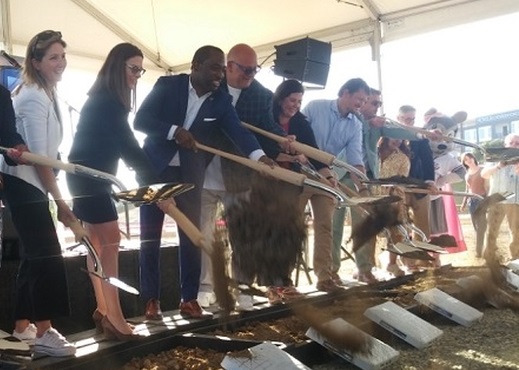
Taking part in the groundbreaking were City Councilmember Katherine Jordan, left, and starting third from left: Mayor Levar Stoney, Lou DiBella, Council President Kristen Nye and CAO Lincoln Saunders.
Stoney and City Council members also acknowledged tough talk and disagreements along the way, but reiterated that they all worked together to get the new ballpark across home plate.
“It took teamwork, even when it felt like we weren’t all on the same team,” Councilmember Katherine Jordan said at the groundbreaking. “And sometimes we weren’t. But we all had the same goal: keep baseball in Richmond, keep baseball on the boulevard, keep the Squirrels here and give them the stadium they deserve.”

The future CarMax Park that will replace The Diamond and is to anchor the 67-acre Diamond District development. (Image courtesy Richmond Flying Squirrels)
Editor’s note: This is the full version of a report previously presented in two parts.
“If I sound stressed about this, it is because I am. It’s Thursday, February 16. LFG.”
That was the urgency with which Todd “Parney” Parnell, then the VP and COO of the Richmond Flying Squirrels, ended an email to a group of developers and designers who were working on initial plans for the new baseball stadium to replace the ballclub’s aging home of over a decade, The Diamond.
Responding to an email titled “Napkin Numbers” – a reference to notes he’d jotted down during a call two days earlier – Parnell emphasized the timeframe that the group was facing to deliver a new ballpark by Opening Day 2025, the deadline that Major League Baseball had set for all pro baseball venues to meet required facilities standards.
In his reply, Parnell told the group: “We really need you guys to move forward with your development deal so we can really get down to business. We are running out of time on the baseball side and I am becoming…increasingly scared but I don’t control your deal only the developer and the city does.
“So please. Get it done. We need progress and we need it now,” Parnell wrote, ending his message with “LFG” – an acronym for “Let’s freaking go,” or a more colorful version.
That was early 2023.
Final terms for a deal between the City of Richmond and its selected development team at the time, RVA Diamond Partners, would be reached three months later. But the lead developer on that team, D.C.-based Republic Properties, refused to sign off on the deal and withdrew from the project, according to filings in a $40 million lawsuit from Republic that now hangs over the larger Diamond District project – the 67-acre development that the new ballpark is to anchor.
A year later, days before City Council this past May OK’d a reworked deal with Diamond District Partners – a new group led by Republic’s former teammates Loop Capital and Thalhimer Realty Partners – Republic principal Jordan Kramer emailed Lincoln Saunders, Richmond’s chief administrative officer, requesting a call with Republic’s legal counsel “to discuss a settlement.”
Saunders replied asking what there was for them to discuss. “The City terminated its negotiations with (RVA Diamond Partners) and Republic a year ago,” Saunders said.
“As you know,” Kramer responded, “there are differences that need to be bridged between Republic and Thalhimer/Loop to resolve our relationship and the relationship between our partnership and the City. We see the City as a part of any resolution.”
“That doesn’t provide any clarity,” Saunders replied. “There is no existing partnership between Republic and the City.”
The email exchanges bookend the final 15 months of a two-and-a-half-year, at-times tumultuous process to find consensus in the design and nail down a development deal for the new ballpark – now to be named CarMax Park – that had been promised to the Flying Squirrels since the team arrived in Richmond 15 years ago.
Emails obtained by Richmond BizSense through Freedom of Information Act requests to the city reveal how contentious that process became, how the project was reworked and salvaged over that time, and how it came to be that Republic – and later Loop – stepped away from the $2.4 billion public-private project they had won with Thalhimer over 14 other development teams that competed for it.
This report was compiled from those emails, court filings from the lawsuit, and BizSense’s reporting.
‘Little progress on plans’

The Flying Squirrels’ Todd ‘Parney’ Parnell addressing attendees at the development team announcement for the Diamond District project in September 2022. (BizSense file photos)
By the time Parnell sent his “Napkin Numbers” email, RVA Diamond Partners was months into the process that started in fall 2022 with a design charette involving Flying Squirrels staff and VCU Athletics, whose Division I baseball team shares the minor-league ballclub’s facilities.
Also involved in the charette were DLR Group and JMI Sports – RVA Diamond Partners’ stadium designer and development consultant, respectively. DLR’s minor-league credits had included Fluor Field stadium in Greenville, South Carolina, and JMI had worked on Chase Center in San Francisco and Petco Park, home to MLB’s San Diego Padres.
But as the process played out over months, with the ballpark being shaped based on the Squirrels’ feedback and within the confines of an originally $80 million projected budget, Squirrels leadership became frustrated with how the process was going in light of MLB’s spring 2025 deadline, which left just enough time for what developers said would need to be at least an 18-month build.
The ballclub’s dissatisfaction was aired publicly in April of last year, when president and managing general partner Lou DiBella put out a statement saying there had been “little progress on plans for a new stadium” and that the club “cannot be confident that the future of the Squirrels in Richmond is secure.”
At the same time, Squirrels leadership had warmed to and stayed connected with David Carlock, principal of Houston-based Machete Group, which had led the runner-up development team that lost out to RVA Diamond Partners. That team had included architecture firm Odell (now LaBella Associates), which designed the minor-league BB&T Ballpark in Charlotte.
DiBella’s statement frustrated city officials and Jason Guillot, the Thalhimer principal who was RVA Diamond Partners’ local lead on the Diamond District.
While setting up a group meeting two weeks after DiBella’s statement, Guillot asked Carlock in an email: “How do we keep all the parties focused to make some progress? I don’t believe that airing our dirty laundry in the press helps us close a deal.”
In another email the same day to Jonathan Fine, an attorney and sports industry advisor for the city, Guillot said he believed that, “after many months, I’ve finally earned some trust by Lou, Larry and Parney,” referring to DiBella, Squirrels co-owner Larry Botel, and Parnell.
However, Guillot added: “I do believe their public display is not fair to the City and to us given how much time we have invested with them to get to this point.”
In the following weeks, the parties held a group call with MLB-owned Minor League Baseball and met with stadium designer DLR during a ChamberRVA-led trip to Kansas City, Missouri, where Guillot, Carlock, Parnell and others toured the stadium for MLB’s Kansas City Royals.
But Guillot’s hopes of having earned DiBella’s trust were soon dashed – as Guillot relayed in an email to Fine, Richmond CAO Saunders and Leonard Sledge, the city’s then-economic development director.
Describing a call he had with DiBella the previous day – the same day that City Council approved the initial development deal with RVA Diamond Partners – Guillot wrote that DiBella had said “that he should have objected more to our team getting selected by the City and that I’m no friend of his.”
“I told him while I don’t expect to win his friendship, we do need to work together productively and that negative quotes in the media by him undermines our ability to convince bond investors that we have an exceptional project and that we’re all rowing in the same direction,” Guillot wrote, adding: “perception matters.”
“He of course took great offense at this and claims he’s not said anything untrue. As we wrapped up the call, he said he should just sell the team because the hassle isn’t worth it,” Guillot wrote. “I asked him what his price is because I might be able to pull together an investor group to take him out. Of course, he said he wants to wait for the new ballpark to be built…”
‘We still have a lot of trust to rebuild’

The area that makes up the Diamond District includes the namesake baseball stadium and nearby Sports Backers Stadium.
As tensions were growing between the developers and the Squirrels, they’d also grown between the city and Republic, the lead developer on RVA Diamond Partners that had brought locally based Thalhimer and Chicago-based Loop into the fold.
In early April 2023, a week before DiBella made his frustrations public, Republic sent the city a list of issues with the project that it wanted addressed before it would sign off on a formal development deal. One of those issues was whether the ballpark budget, which by that point had grown to over $90 million, was not sufficient to the city.
A gulf had formed between the parties over the desired capacity and cost of the ballpark, which RVA Diamond Partners had been planning as a 9,000-seat stadium. The Squirrels were insisting on a 10,000-capacity venue – a change that, among others, would ultimately push the ballpark’s cost to over $117 million.
In an email to Republic later that month, Saunders, the CAO, said the city had proposed a financing plan for the stadium, “sized in a manner that we believe is appropriate for the City, that further reduces the financial risk for RVADP while increasing the financial risk for the City.”
Later, while insisting on a meeting with the developers the next day, Saunders added in that email: “We still have a lot of trust to rebuild to get back to a position of feeling comfortable with moving forward with this partnership. Hearing your response tomorrow will be critical to knowing whether we should continue working to reach agreement.”
A deal with RVA Diamond Partners would ultimately be reached. But, soon after the development agreement was approved by City Council, Republic notified Thalhimer that it was exiting the project and “confirmed in writing that it would not continue to participate in the development,” Thalhimer has said.
Republic also notified the city that it had made an offer to Thalhimer and Loop “that would remove us from RVA Diamond Partners and enable them to move forward with the development of the Diamond District,” Republic’s Jordan Kramer said in a May 2023 email to Richmond’s Saunders and Sledge.
“If accepted, Republic would no longer be party to the teaming or operating agreements,” said Kramer, son of Republic board chairman Richard Kramer. “We are waiting to see if Loop and Thalhimer agree to our terms but until we get a firm answer, there’s nothing else we can do at this time.”
Republic had previously told the city that it would deliver by the day of Kramer’s email an operating agreement and governance documents for RVA Diamond Partners, which the three companies were restructuring. The LLC had been structured, according to Republic’s lawsuit, with Republic and Loop each owning 40% and Thalhimer owning 20%.
In a prior email to a lawyer for RVA Diamond Partners, John O’Neill – an attorney with Hunton Andrews Kurth, the city’s outside legal counsel – said the group had “reported that meaningful progress was being made in (the) LLC’s restructuring” and “conversations with additional equity participants were advancing…,” but that Thalhimer had since informed the city that “restructuring progress has stalled.”
With no documents delivered by the date they’d said they would be, Saunders, the city CAO, sent the three companies an email terminating their negotiations on the Diamond District.
“This notification of the consequences of (RVA Diamond Partners’) failure to make such delivery followed the prior failure of RVADP to (1) deliver such governance documents with the terms the City required and (2) execute and deliver the Development Agreement and Purchase and Sale Agreement in a timely manner…” Saunders’ email said.
“We are very disappointed that this action is occurring. But after months of negotiations with RVADP after its selection as the preferred proposer for the Diamond District project…the City can wait no longer for RVADP to resolve whatever internal issues it is facing and risk losing its ability to timely undertake this critical economic development priority.”
The timing of the ballpark had become more urgent in light of MLB’s deadline for all pro baseball venues to meet new facility standards by Opening Day 2025. Months before Saunders’ email, MLB had required $3 million in upgrades to The Diamond that the city had to spend to keep the Squirrels playing there in the meantime.
By the time final terms for the original development deal had been reached, however, officials acknowledged that the ballpark would not meet the 2025 deadline and started aiming instead for spring 2026 – an extension that MLB has appeared to allow.
‘A powder keg with a lot of moving parts’
With Republic off the project, and with no formal agreement with RVA Diamond Partners, the city started weighing how to move the project forward.
In the days following Saunders’ email terminating their negotiations on the Diamond District, George Keith Martin, an attorney with McGuireWoods who was representing RVA Diamond Partners, sought clarification on the fate of the project and asked the city’s outside legal counsel if a deal could be salvaged.
“Does this mean that the City is terminating the award? Is the City willing to work with the RVADP team if they are able to work out an acceptable solution shortly,” Martin asked in an email to John O’Neill, the Hunton attorney representing the city.
O’Neill replied that if the team had solutions it wanted to propose, it should do so “without delay.”
“But,” O’Neill added, “RVADP should understand that the City is evaluating alternatives to achieving the Diamond District project. It will not suspend this evaluation waiting for any solution RVADP wishes to offer and will pursue the approach that is in the best interest of the City.”
Meanwhile, the city continued to work with Thalhimer and Loop, with Thalhimer’s Jason Guillot running point in discussions with the Flying Squirrels ballclub.
At the same time, Squirrels leadership had been informally working with David Carlock, who’d begun advising the Squirrels in design negotiations. Carlock’s Machete Group, the Houston-based venue advisory and development management firm, would later officially become the Squirrels’ stadium consultant, replacing JMI Sports in an arrangement that also saw architecture firm LaBella Associates take over the design work from DLR Group.
Development duties for the overall Diamond District project were ultimately divvied up, with the Squirrels and Machete taking the lead on the ballpark, and Thalhimer and Loop responsible for the rest of the private development in the mixed-use project that’s to also include residential and commercial buildings.
But before that arrangement was formalized, tension between the parties continued to build, emails show.
In late June of last year, weeks after his reported call with Squirrels President Lou DiBella, Guillot declined a request from Carlock and Larry Botel, a Squirrels co-owner, for a look at the stadium’s soft costs budget – the amount of money set aside for non-construction expenses.
“I’ve spoken to the City and we prefer to manage the soft cost budget between the City/Developer at this stage,” Guillot told them in an email.
“The City has been very intentional about setting a not-to-exceed $90,000,000 budget for the hard costs associated with the ballpark and has agreed to an open-book, transparent process whereby they are allowing the team to take the lead on the vast majority of the design decisions despite 100% of the capital costs for the development being funded by the City.
“This is a very fair structure for all parties involved and ensures that the team has ‘ownership’ over the design and while not having any responsibility for the cost of construction as a tenant. The $90,000,000 hard cost budget will not be impacted by any soft costs,” Guillot wrote, adding that “it is our responsibility to ensure that all applicable soft costs are covered by the budget, and if not, for the (City)/Developer to be responsible for any overage.”
Carlock countered that “it’s important that we understand at minimum (1) how the city is allocating project costs and (2) that we know where costs are being carried.” He added: “Please let us know when you will have a soft cost budget available for review,” to which Guillot replied: “We are not sharing the soft cost budget at this time.”
Guillot’s stance prompted a strong response from Botel, the Squirrels co-owner, who pleaded that they all be on the same team.
“(Carlock) and I cannot be the only people on this entire deal trying to move it forward. We need your help,” Botel told Guillot. “You above everyone else on the city and developer side know that the only way this is going to get done is with full cooperation and give and take from all sides of the transaction. (It’s) real estate development 101.”
Contending that Guillot’s statements about a transparent process and the city funding all capital costs while the Squirrels had no responsibility for construction costs as a tenant “are just not true,” Botel said: “This is a $110mm project and (it’s) not open book on $20mm of it.”
Adding that he and Carlock had developed a good rapport with Lincoln Saunders, the city’s chief administrative officer, and that Saunders had been open to many requests they had made, Botel told Guillot, “we are looking to you to do the same.”
“As you know this is a powder keg with a lot of moving parts. We are trying to do everything we can to get to the finish line but (can’t) do that without everyone’s cooperation. We feel like the city is there as best they can be but we need you to be as well. It will only benefit the overall transaction and give it the best chance of getting done.
“This involves not only providing information but also making sure the city is doing everything it can to push the process forward. We are still greatly concerned that DLR and the predevelopment process is underfunded. The fact that we don’t know the water table and soil conditions at this point is troubling to say the least,” Botel said.
“The next 30 days are critical. The schedule allows for no give to get us to opening day 2026. Any pressure you can put on the city to keep things moving, including pressure on them to fund costs, is needed,” Botel said. “Any reasonable information we ask for which will help us get comfortable with signing a lease will help greatly. We need you and Thalhimer to be with us on this.”
‘Walking a fine line’

The Flying Squirrels are to continue playing at The Diamond while the new stadium is being built beside it.
In his earlier emails with Jonathan Fine, the city’s sports industry advisor, Guillot described working with both the city and the Squirrels as a delicate balancing act.
“I always felt like I was walking a fine line because the City did not want me talking to the team without them present on every call, but it wasn’t always practical to make sure everyone was on every call and email, especially those that were impromptu,” Guillot told Fine.
“My goal since the project award in September was to develop a relationship and trust with the team, while acknowledging the process that the City outlined and wanted to manage,” he said. “At times I felt like I was threading the needle to manage relationships with both the City and the Squirrels, but my goal was to try and show progress on design and programming while knowing that we were limited in continuing to spend design fees before having a contract with the City.”
As work continued through 2023, Thalhimer and Loop sought to see through their part of the project with another partner to replace Republic. At one point they engaged Lincoln Property Co., a Dallas-based developer that by then was vying for Richmond’s City Center project to replace the downtown Coliseum.
Lincoln Property ultimately did not sign on, and Thalhimer and Loop changed course and reached out to Richmond investors to raise millions of dollars in additional capital needed to move forward with the project without Republic’s investment.
Around the same time, Machete Group had engaged Peterson Cos., a Northern Virginia development firm, about potentially getting involved in the project – an option that was given consideration by the city.
But by this past spring, the city opted to stick with Thalhimer and Loop, and worked out a new deal with Diamond District Partners, the new development team entity that did not include Republic. The deal changed the scope of the project to a 30-acre first phase that Diamond District Partners is signed on to develop, with the rest of the 67-acre site, minus the stadium, to be sold and developed in subsequent phases.

Construction underway on CarMax Park, which will replace the adjacent, nearly 40-year-old Diamond. (Skyshots Photography)
The deal also changed the project’s financing approach, with the city taking on the debt obligation for $170 million in bonds for the ballpark and first-phase infrastructure improvements. Tax revenue from the ballpark and initial development is to be used to pay off the bonds.
Unknown at the time, but soon after the new development deal was OK’d by City Council in May, Loop began to back away from the project, ultimately bowing out as an investor and leaving Thalhimer to lead the team solo.
Two months later, Republic hit Thalhimer and Loop with its $40 million lawsuit, alleging that they breached a venture partnership with Republic when they formed the new entity and entered the new agreement with the city. Thalhimer is fighting the lawsuit, which its CEO has called “baseless,” while Loop contends that it never signed on to either team iteration and should be dropped from the suit.
According to the lawsuit, Thalhimer and Loop proposed buying out Republic’s 40% interest in the venture, and Republic said it would consider a buyout offer. But when they made an offer this past April, the suit states, Thalhimer and Loop “then indicated that they did not have the resources to close on the purchase.”
It was then that Republic’s Jordan Kramer emailed Lincoln Saunders, the city CAO, requesting to discuss a settlement. The email was sent May 5 – three days before City Council’s vote to approve the new agreement.
Home stretch

Todd ‘Parney’ Parnell, now a senior advisor with the Flying Squirrels, livens up the crowd at the CarMax Park name announcement in September.
While the lawsuit looms over the larger Diamond District development, which Diamond District Partners is aiming to start next fall, work on CarMax Park is now underway, following approvals of lease and development agreements between the city and the Squirrels.
Under the agreements, the ballclub is to pay $3.2 million in annual rent to the city EDA for each of the first 10 years of a 30-year lease, with lower rents in subsequent years. The overall rent payment over the 30-year lease totals $66 million – among the highest leases in Minor League Baseball, DiBella has said.
The rent commitments were part of a deal worked out between the Squirrels and the city, in which the ballclub agreed to cover any cost overages above the stadium budget. DiBella has said the arrangement was possible only with CarMax’s financial commitment for the ballpark’s naming rights. Terms of that deal have not been disclosed.
At the naming rights announcement and a groundbreaking ceremony for CarMax Park this September, those involved in getting the project to that point acknowledged the rocky road they’d taken to get there.
Addressing CAO Saunders and Mayor Levar Stoney at the naming announcement, DiBella said: “It was hard getting here, not without pain and suffering. And you guys got MF’d enough by me,” prompting laughs from the crowd.
“Lincoln and I, it was so tense with us for so long. But I’ve got to tell you something, I never doubted his commitment to wanting us to get here in a deal that he could feel proud presenting to the citizens of Richmond,” he said.
Addressing Saunders and other officials at the groundbreaking days later, DiBella added: “There were times I didn’t think you knew what the hell was going on or what we were doing. But I’ve got to tell you the truth, I never doubted your commitment to getting it done.”

Taking part in the groundbreaking were City Councilmember Katherine Jordan, left, and starting third from left: Mayor Levar Stoney, Lou DiBella, Council President Kristen Nye and CAO Lincoln Saunders.
Stoney and City Council members also acknowledged tough talk and disagreements along the way, but reiterated that they all worked together to get the new ballpark across home plate.
“It took teamwork, even when it felt like we weren’t all on the same team,” Councilmember Katherine Jordan said at the groundbreaking. “And sometimes we weren’t. But we all had the same goal: keep baseball in Richmond, keep baseball on the boulevard, keep the Squirrels here and give them the stadium they deserve.”

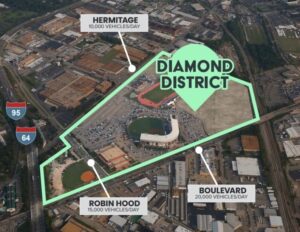
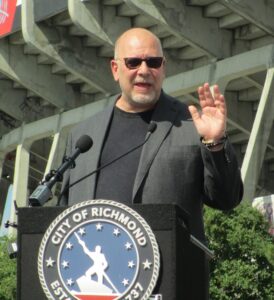
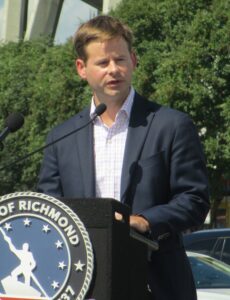
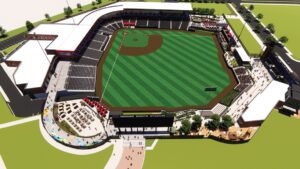
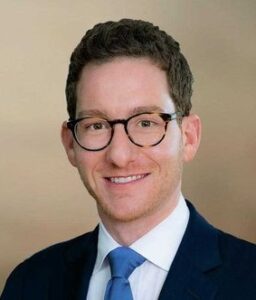
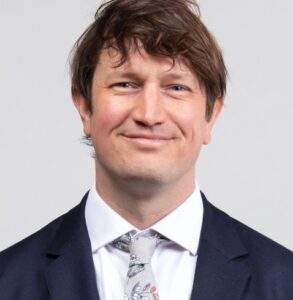
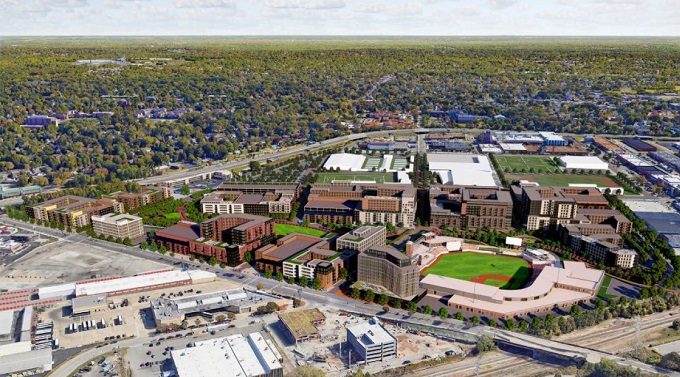

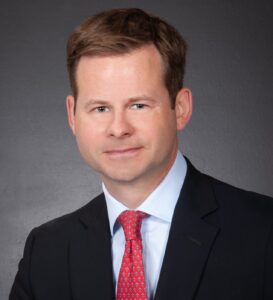

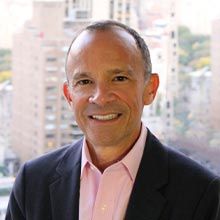
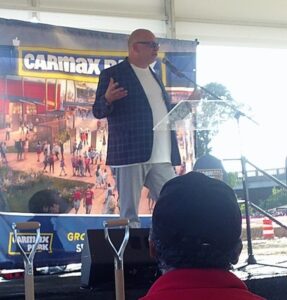


If the winner of the RFP changed form after what originally “pitched” to the city, why didn’t the city reject them and start negotiations with the second-best proposal group?
The MLB time restraints. The project cost the same regardless who builds it. The alternative would have been to toss out the baseball element and restart the development proposal. It might have been the best alternative.